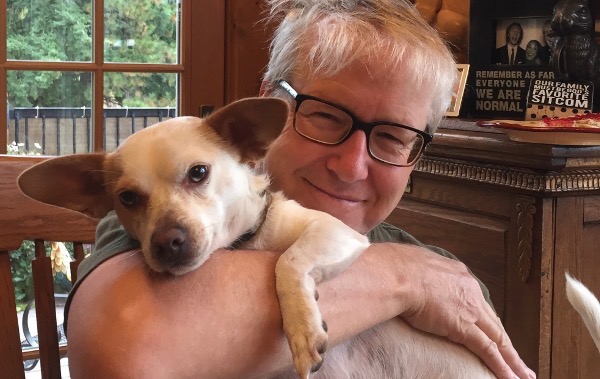Dr. Marty Becker
One of my first memories as a child was of my father, R.J. Becker, walking slowly back into our southern Idaho farmhouse, supported by my mother, Virginia. He slowly turned his head and looked at me and I didn’t see my dad.
R.J. was a farmer, rancher, and dairyman. Why all three? He broke the back of our 160-acre farm to make farm payments, pay loans for seed and fertilizer, make repairs to aged farm equipment, and have enough for necessities and a few niceties. He was strong of build. There are black-and-white photos of my older brother, Bob Jr, and I holding onto his Popeye biceps as if they were chin-up bars. Athletic, he could make a baseball smoke, throw a football 50 yards, and do Herculean feats of lifting. He could carry a 100-pound haybale in each hand. Folks in our Castleford, Idaho, community nicknamed him Charles Atlas (look it up). But everyone also knew dad was weak. Weak of mind.
They knew because there were many times when he was so depressed, he couldn’t get out of bed for months at a time. My brother and I milked the cows before and after school. Neighbors pitched in to help us harvest our crops and take our steers to market. Then the switch would flip, and Dad would be manic. Mania meant excessive drinking, philandering, gambling, wanting to sell the ranch, and constant threats of splitting up our family through divorce. I remember a pastor cautioning that Dad might take his life with depression but would ruin his life with mania.
Back to when dad looked at me. When he turned his head, I could see where the hair had been cut short on the sides of his head and I could see circles burned into his scalp. I only learned later in life that he’d had shock treatments to try and jump-start his brain out of depression. To get out of the darkness, he was willing to fry his brain (this isn’t much of an exaggeration as the shock treatments of the day were not microdoses and were not done under anesthesia like they are today).
The treatments turned Dad into sort of a zombie. No short-term memory, no joy, a 1000-yard stare. Manic depression is hereditary. Dad’s father, brother, and sister all committed suicide. So did Dad. I’ve had suicidal thoughts as well. My Mom’s genetics gave me a Mensa brain, photographic memory, creativity, and a can-do spirit. Mom’s seemed to define me until my 40s when the “dark clouds,” as Dad used to call them came rolling in.
I’ve always felt that God has played favorites with me. I’ve been married for 43 years to the love of my life, Teresa. I have a great family. I love where I live, love what I do, and feel blessed. But I also have manic depression. My lows aren’t as low as Dad’s; I’ve never been bedridden or had to have shock treatments. Nor are my highs. No excessive drinking, gambling, or risky behavior; just a propensity to spend too much money or give too much money away. In some ways, mania has been a great blessing.
Mania allows you to think that nothing is impossible, and creative ideas can come at you like a summer hailstorm. I know that Fear Free came out of mania. I knew it was something that had to be successful because it helped all stakeholders. The only “no” I knew was “no problem.”
People in our community growing up were either heartbroken for R.J. Becker or scared of him. They didn’t want to see the strongman weak. They also didn’t want to see the strongman intoxicated and angry. Dad? He hated himself, even during the periods when he wasn’t depressed or manic. He was embarrassed. Felt weak and worthless. Even though through his efforts he put all four of his children through college; a physician, an attorney, and a veterinarian. His suffering and shame ended when he mouthed a shotgun just after his 80th birthday.
I’ve taken a different route. Dad wouldn’t take his medication because he didn’t need it. I always take mine because I know I have to have it. Dad would only talk about his problems with a minister. I trust boarded psychologists and therapists. Dad covered up his mental illness. I share mine with the world because I know that I can help others be successful in treating their mental illness.
I can’t tell you how many times I’ve had people say, “You have depression? You have everything!” Yes, I’ve got a successful relationship with God, Teresa, my family, my friends and neighbors. Yes, I’ve had a very successful career by all measures. Yes, I’ve seen the world (89 countries) and live in a beautiful log home on a drop-dead gorgeous horse ranch in the mountains of northern Idaho. Yes, I’m part of something that’s changing the world for animals, literally and figuratively, with Fear Free. I do have everything. Except for the right brain chemicals to be happy, healthy, and alive.
In 2020, at age 66, I had my first serious suicidal thought. It was right at the start of COVID, and as I drove home from the airport in Spokane, Washington, to our ranch in Bonners Ferry, Idaho, I looked over at a frozen lake I’d driven by hundreds of times and thought, “I think I’ll just drive over the railroad tracks, onto the thin ice of the lake, and sink.” Blessedly, because of my faith, family, and the mental strength I’ve developed from therapy, my next action after this sinking feeling was to stop the pickup, call my doctor, and make an appointment.
I hope that this message serves to let you know that if you’re depressed, anxious, or suffer any other mental health issue, you’re not alone. To let you know that there are dozens of crazy-happy people you know who are so sad and depressed inside. To paraphrase an old drug message, “Just Say Know.”
If you are in the U.S. and suffer from depression or suicidal thoughts of any sort, please call the National Suicide Prevention Lifeline (800-273TALK; 800-273-8255; suicidepreventionlifeline.org). It’s available 24 hours a day, seven days a week. No matter what problems you are dealing with, people on the other end of the line will help you find a reason to keep living. You can find resources outside the U.S. here.(https://www.drmartybecker.com/this-and-that/merry-christmas-and-support-for-those-who-arent-merry/)
This article was reviewed/edited by board-certified veterinary behaviorist Dr. Kenneth Martin and/or veterinary technician specialist in behavior Debbie Martin, LVT.




